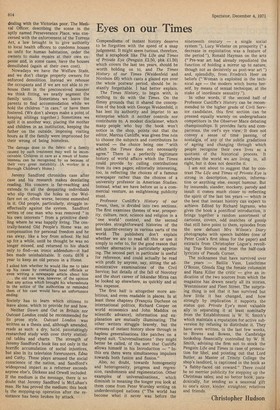Down and outcast
Gillian Freeman
Down and Out in Britain Jeremy Sandford (Peter Owen £2.75) Outcast London Gareth Stedman Jones (OUP £4.50) The assistance of the police was requested by the owner . . . and the desperate character of those obstructing the carrying out of the order may be imagined when 15 or 20 constables were required . . . to assist the landlord in ejecting those who were living there.
They are destitute. The only possessions they have are the clothes they are wearing. It Is disgraceful. Bureaucracy gone mad. The Council spared no thought for these children. This family was £35 behind with the rent. The husband . . . had had a nervous breakdown a few days before the eviction.
In York Court many of the poor, wretched occupants, after having been turned out of their miserable homes, stole back again and remained there until a greater proportion of the woodwork of the house had been used for fires to warm them.
Certainly my play Cathy was about Britain's intolerable housing lists. But it was about other things too, more important things. It was about compassion and it was about that curious scheme of values which results in local authorities turning people out of " inadequate " accommodation which in other countries would have at any rate kept them together.
No prizes for guesing the last authorship; and the others are, in order, the Medical Officer of St. George in the East, an NSPCC Inspector from Newport and a journalist writing in a publication called Charity Organisation Reporter. The most chilling aspect of their similarities is that two of the incidents are separated from the third by a century. The Newport affair is on the current files and quoted by Jeremy Sandford in Down and Out in Britain. The other evictions took place in 1872 and 1876 and are referred to in Outcast Landon, a book
dealing with the Victorian poor. The Medical Officer, describing the scene in the aptly named Perseverance Place, was concerned with the enforcement of the Torrens Act, a law brought in to give authority to local health officers to condemn houses as unfit for human habitation, order the owners to make repairs at their own expense and, in some cases, have the houses demolished (again at their own cost).
Nowadays we have the Welfare State, and we don't charge property owners for enforced demolition. Instead we rehouse the occupants and if we are not able to rehouse them in the preconceived manner we think fitting, we neatly segment the family units. Sometimes we leave the parents to find accommodation while we hold the children "in care," or have them fostered. (We don't always make a point of keeping siblings together.) Sometimes we split it in another way, placing the mother and children in an institution, keeping the father on the outside, imposing visiting hours as if the family were imprisoned for their wrong of being homeless.
The damage done to the fabric of a family caused by such treatment may well be inconceivable. Children in care as a result of homelessness can be recognised by us because of their very great instability. (A worker in a Borough Children's Home.)
Jeremy Sandford chronicles case after case and his research makes desolating reading. His concern is far-reaching and extends to all the despairing individuals who slip through the holes in the Welfare net or, often worse, become enmeshed in it. Old people, particularly, struggle ineffectually against the system. Sandford writes of one man who was removed "in his own interests" from a primitive dwelling where he was happily living. The centrally-heated Old People's Home was no compensation for personal freedom and he ran away, like a boy from school. He hid up for a while, until he thought he was no longer missed, and returned to his shack only to find—an ironic addendum--it had ben made uninhabitable. It costs £676 a year to keep an old person in a Home.
I asked him whether he would like me to take up his cause by contacting local officials or even writing a newspaper article about him . . . the old man was, however, of the opinion that any action which brought his whereabouts to the notice of the authorities or reminded them of his case would have an unfortunate ending.
Society has to learn which citizens to leave alone, which to provide for and how.
Neither Down and Out in Britain nor Outcast London could be recommended for its prose style. Outcast London was written as a thesis and, although amended, reads as such: a dry, lucid, painstakingly researched study with •over thirty statistical tables and charts. The strength of Jeremy Sandford's book lies not only in the horrific accumulation of social injustices, but also in its television forerunners, Edna and Cathy. These plays aroused the social conscience of the nation, and Sandford's widespread impact as a reformer exceeds anyone else's, Dickens and Orwell included. If the medium is the message, there is no doubt that Jeremy Sandford is McLuhan's man. He has proved the medium; this book Is the mopping-up operation after the resistance has been broken by attack.











































 Previous page
Previous page